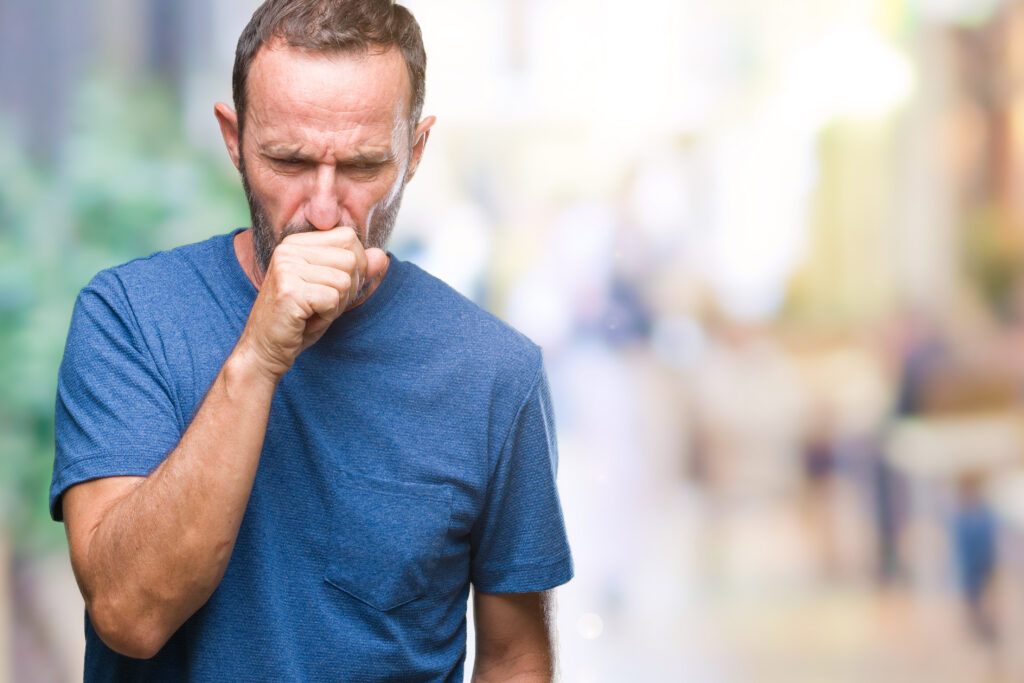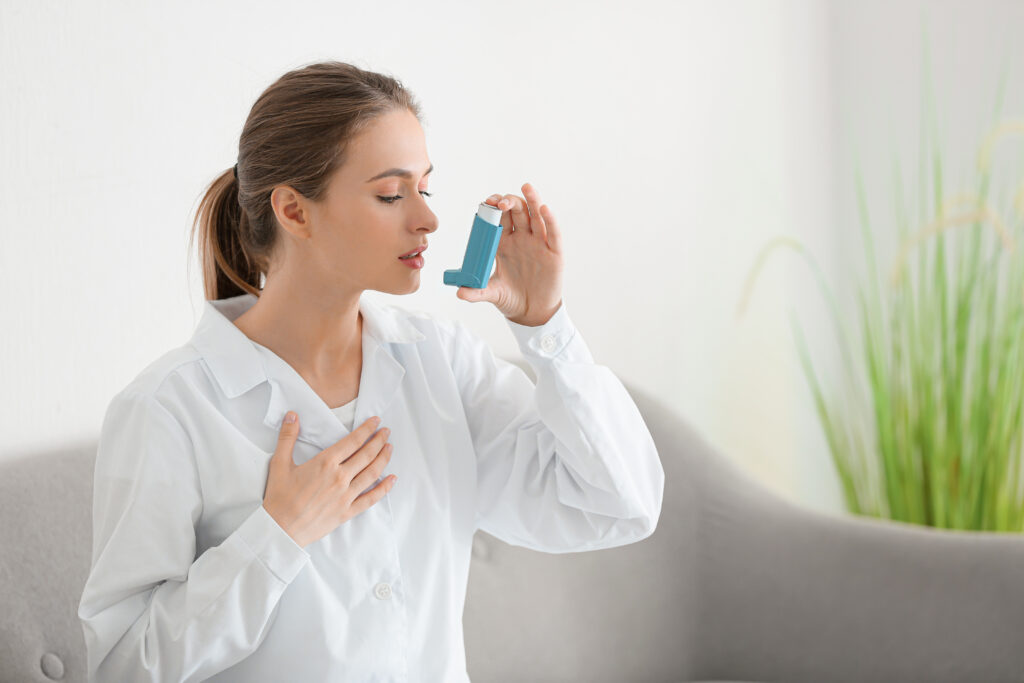July 21, 2023
Why Does It Hurt When I Cough?
A cough can be caused by many health conditions, including the common cold and flu. The type of cough you have depends on its underlying cause. For instance, a wet cough may be caused by a sinus infection, while allergies may cause a dry cough.
Some coughs can cause pain in your chest, back, stomach or rib pain. If you have a painful cough, it’s important to see a doctor immediately. A cough that causes pain anywhere in your body could indicate a serious infection requiring prompt treatment.
Here’s a look at the top seven reasons you may have a painful cough and how to request an appointment with Healthcare Associates of Texas if you need treatment.
Why Does My Back Hurt When I Cough?
If your coughing has been severe or intense for several hours or days, it’s normal for your back to start hurting. The act of coughing can strain your back because it causes your upper body to move and lean forward. Many times, it is your lower back that will be affected by coughing.
Why Does My Stomach Hurt When I Cough?
Coughing can also strain the muscles in your stomach or abdominal region. The soreness or pain you may feel in your stomach from coughing is similar to that which can happen when you laugh really hard, or when you sneeze. Intense, severe and repeated coughing can often cause your stomach to hurt.
Why Do My Ribs Hurt From Coughing?
If your ribs hurt when coughing, it’s possible you may have pulled or strained one of your intercostal muscles. The intercostal muscles are the muscles in your rib cage. Severe or repeated coughing can sometimes cause those muscles to stretch or partially tear.
Top 7 Reasons Why It Hurts to Cough
There are many other reasons you may be feeling pain when you cough. Coughing-related pain in the back, stomach or ribs can indicate several underlying medical conditions. Your doctor can perform an exam and run the necessary tests to diagnose the root cause of coughing pain.
1. Muscle Fatigue
The most common cause of pain when coughing is muscle fatigue. Coughing works many different muscles in your upper body and can make them sore if you have been coughing severely or for a long time. With coughing-induced muscle fatigue, the pain you feel will usually peak during a cough and go away when you have stopped coughing.
2. Bronchitis
Bronchitis is a respiratory infection that occurs when your airways become inflamed and swollen. It can cause a painful, intense wet cough that brings up mucus. You can develop bronchitis after having a viral infection such as the common cold, flu or COVID-19.
Other symptoms of bronchitis include:
· Chest pain
· Sore throat
· Headache
· Shortness of breath
· Fatigue
· Low fever
· Wheezing
· Body aches
3. Pneumonia
Pneumonia is a lung infection that can cause your airways to fill up with fluid. It is usually caused by exposure to bacteria, viruses or fungi, and can be life-threatening when not properly treated.
This infection can cause a sharp, stabbing pain in the chest when you cough, and the cough may be wet or dry. Other symptoms of pneumonia include:
· Fever
· Chills
· Rapid or shallow breathing
· Shortness of breath
· Low oxygen levels in the blood
· Fatigue
· Nausea and vomiting
4. COPD
Chronic obstructive pulmonary disease (COPD) is a blanket term for lung conditions that cause less air to flow in and out of the airways. Your airways can become inflamed and swollen, making it difficult for you to breathe.
Coughing and chest pain are the most common symptoms of COPD. Every cough is usually ongoing and produces a lot of mucus. Other symptoms of COPD include:
· Tightness or heaviness in the chest
· Shortness of breath
· Wheezing
· Fatigue
5. Asthma
 Asthma is a chronic condition that causes inflammation and narrowing of the airways. Its primary symptoms are chest pain and coughing, usually worse early in the morning and at night.
Asthma is a chronic condition that causes inflammation and narrowing of the airways. Its primary symptoms are chest pain and coughing, usually worse early in the morning and at night.
Symptoms of asthma are usually triggered by certain substances you breathe in. Common asthma triggers include pollen, mold, dust, pet dander and perfume. If your painful cough is caused by asthma, you may also experience symptoms, including shortness of breath and wheezing.
6. Pleurisy
Pleurisy is a condition in which your pleural tissue becomes inflamed. Pleural tissue covers the outside of your lungs and the inside of the chest wall. This condition is usually caused by the same viruses, bacteria and fungi that cause pneumonia, or by autoimmune conditions such as lupus or rheumatoid arthritis.
The number one symptom of pleurisy is chest pain that worsens when you cough. Other symptoms of pleurisy include:
· Cough
· Fever
· Difficulty breathing
· Shortness of breath
7. Lung Cancer
A painful cough may also be caused by lung cancer. Smoking is the number one cause of lung cancer, so your risk for this disease is higher if you are a current or former smoker.
Coughing and chest pain are top symptoms of lung cancer. Other symptoms of this disease include:
· Unexplained weight loss
· Loss of appetite
· Weakness
· Fatigue
· Shortness of breath
· Wheezing
· Hoarse voice
How to Find Relief From a Painful Cough
The best way to relieve pain caused by a cough is to identify and treat its root cause. Make an appointment with your doctor immediately if you are experiencing a painful cough. Your doctor can review your medical history, talk to you about your symptoms and run tests to find out what is causing you to experience pain when you cough.
In the meantime, steps you can take to reduce cough-related pain include:
· Taking over-the-counter pain medicines
· Using cough drops
· Getting plenty of rest
· Drinking plenty of warm beverages like herbal tea
· Running a humidifier while you sleep
· Taking a steam bath or shower to loosen mucus in the chest
· Avoiding pollution, including secondhand smoke
· Not smoking
Your doctor can talk to you in greater detail about your treatment options based on the root cause of your cough.
Request an appointment with Healthcare Associates of Texas today for treatment for any medical issue, including a painful cough. We offer high-quality healthcare services, including primary care, imaging, sleep medicine and much more!
References
1.NIH. 2022. “Bronchitis | NHLBI, NIH.” www.nhlbi.nih.gov. December 2, 2022. https://www.nhlbi.nih.gov/health/bronchitis.
2.National Heart, Lung and Blood Institute. 2022. “Pneumonia | NHLBI, NIH.” www.nhlbi.nih.gov. March 24, 2022. https://www.nhlbi.nih.gov/health/pneumonia.
3.National Heart, Lung, and Blood Institute. 2022. “COPD – What Is COPD? | NHLBI, NIH.” www.nhlbi.nih.gov. March 24, 2022. https://www.nhlbi.nih.gov/health/copd.
4.”Asthma – Symptoms | NHLBI, NIH.” 2022. www.nhlbi.nih.gov. March 24, 2022. https://www.nhlbi.nih.gov/health/asthma/symptoms.
5.Hunter, Michael P., and Hariharan Regunath. 2020. “Pleurisy.” PubMed. Treasure Island (FL): StatPearls Publishing. 2020. https://www.ncbi.nlm.nih.gov/books/NBK558958/.
DISCLAIMER
The information featured in this site is general in nature. The site provides health information designed to complement your personal health management. It does not provide medical advice or health services and is not meant to replace professional advice or imply coverage of specific clinical services or products. The inclusion of links to other web sites does not imply any endorsement of the material on such websites.